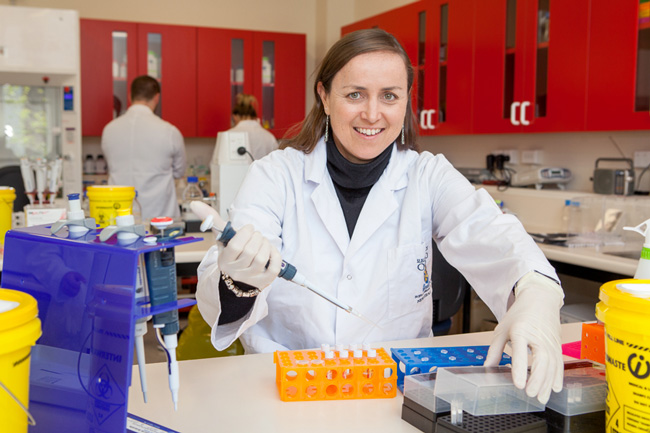
The 2016 Translational Research Grant winner Professor Alison Heather working in the lab. Photo: Sharron Bennett.
The winner of this year's Translational Research Grant hopes to develop a new diagnostic test for recurring breast cancer.
Professor Alison Heather of Physiology has been awarded the $50,000 grant from the Division of Health Sciences to assist her with the development of a new bioassay to detect estrogenic compounds in blood samples.
"It is really exciting that something I invent in the laboratory could be used as a medical diagnostic that could potentially help clinicians that are treating breast cancer patients."
She also hopes to develop variations of the original prototype for other medical and environmental applications.
“Breast cancer affects one in nine women in New Zealand over the course of their lifetime,” Professor Heather explains. “We hope to develop a test that will make it easier to identify those women at risk of relapse.”
Health Sciences' Associate Dean, Research Commercialisation, Professor Ian Tucker says the Translational Research Grant, established four years ago, is an initiative to assist researchers in the pursuit of research which translates into societal benefits.
He says the selection panel, comprising a successful external entrepreneur as well as some University and Otago Innovation Ltd (OIL) staff, was pleased and encouraged by the standard of the applications which has improved every year.
Professor Tucker says Professor Heather will now work closely with OIL to develop or prove the concept.
“OIL staff will also engage with and encourage the other applicants in their translational research efforts.”
Professor Heather, who has been at Otago since 2014, says winning this grant is thrilling.
“As a scientist, I really enjoy inventing and making new things. It is really exciting that something I invent in the laboratory could be used as a medical diagnostic that could potentially help clinicians that are treating breast cancer patients.”
"OIL staff will also engage with and encourage the other applicants in their translational research efforts."
She says she is passionate about making bench science transparent and likeable to general society, and especially trying to get young bright students involved in a science career.
“By being active in translational science, it provides me with an opportunity to discuss this type of science, which is not the conventional idea of what medical research involves, with students and hopefully promote their own interest in pursuing a scientific career.”
However, she is quick to share the credit for the win with the rest of her team.
“To be in the position to pitch for this research award reflects not only my own efforts but also the small team of dedicated researchers, Dr Elliot Cooper and Ms Gillian Hughes, that I have working for me in the laboratory.
“Research is very much a team effort that includes my immediate team, the support of the Department of Physiology, and the research advisors at Otago Innovation that help keep me grounded.”